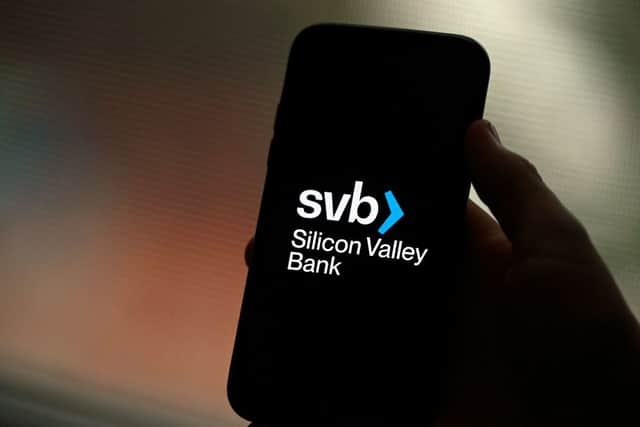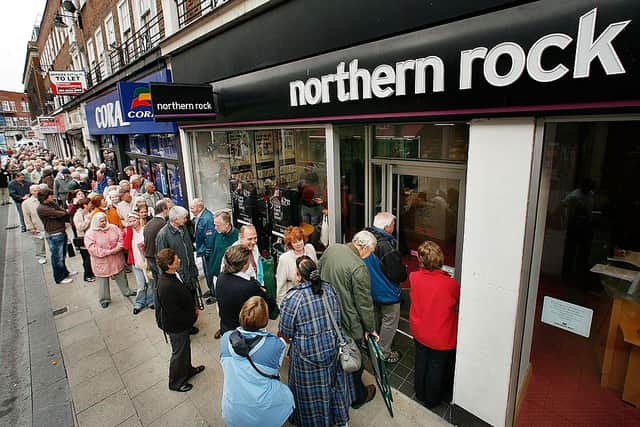Why did Silicon Valley Bank collapse? SVB UK arm and HSBC deal to buy it explained - what’s happening in USA?
and live on Freeview channel 276
Given the economic struggles being faced by the UK, there have been strong echoes of the 2008 financial crisis.
A recession is widely expected to hit the economy at some point in 2023, although growth statistics continue to suggest a more positive picture. And while a housing market crash appears not to be on the cards, prices have been falling (albeit from historic highs) as people struggle to keep up with the cost of living crisis.
Advertisement
Hide AdAdvertisement
Hide AdThe 2008 comparisons appeared to grow stronger on Friday (10 March) when Silicon Valley Bank (SVB) collapsed. It was the largest bank failure for 15 years, and threatened to plunge the financial sector into a meltdown before the US government stepped in to protect deposits.
While SVB was a California-based bank, it had a UK arm. It meant many UK technology and life sciences companies - particularly startups - faced the prospect of losing access to their business accounts, which could have proved damaging - or even terminal - to their business prospects. Although this situation has been averted, fears of a wider international collapse remain.
So, why did SVB collapse - and what does HSBC’s rescue deal mean for customers? Here’s what you need to know.
Why did Silicon Valley Bank collapse?
While it’s not a name you will have heard much of on this side of the Atlantic Ocean, Silicon Valley Bank was a major player in the USA. It was the 16th largest bank before its collapse last week.
Advertisement
Hide AdAdvertisement
Hide AdAlthough its UK arm was much smaller, it still held £6.7 billion in deposits and £5.5 billion in loans, while its balance sheet stood at £8.8 billion as of Friday (10 March), according to the Bank of England. Its clients included Future - the publisher behind titles like PC Gamer and The Week - medical testing firm Diaceutics and digital learning company Learning Technologies Group.


The problems for SVB began in the middle of last week. After a sharp fall in the value of the investments it held, there was effectively a run on the startup-focused bank. This kind of financial event happens when customers attempt to withdraw money en masse because they have low confidence in the bank’s ability to survive.
It tends to be a crisis that feeds itself as the more people who withdraw money, the greater the risk of the bank going bankrupt, which leads more people to withdraw money. The biggest recent UK example of a run on a bank was Northern Rock in 2007.
This type of crisis can also have serious problems for the rest of the global banking system as a run on one bank can reduce confidence in others, or lead to so much scrutiny of the finances of others that they too experience runs (as happened with Northern Rock).
Advertisement
Hide AdAdvertisement
Hide AdNew York-based Signature Bank became the third largest bank failure in US history on Sunday (12 March), as the panic spread through the system. Meanwhile, shares in financial institutions across the globe suffered on Monday as investor confidence in the system waned.
In a bid to prevent the run on SVB from becoming a full-on collapse, the US government intervened on Friday by assuring all of its customers that they would be able to access their accounts on Monday (13 March). It did the same when it intervened with Signature Bank over the weekend, and has sought to sell both institutions on rather than launch taxpayer-funded bailouts.
US central bank the Federal Reserve has also announced an emergency lending programme that it hopes will prop up smaller banks that are struggling in the wake of SVB’s collapse. Analysts believe it should shore up the banking sector, although there have been some fears the move could prompt some firms to make risky investments as US officials are providing a safety net.


Has HSBC rescued Silicon Valley Bank?
UK-headquartered bank HSBC stepped in to buy the UK arm of SVB on Monday morning (13 March). The government and Bank of England had both worked to facilitate the sale, which they said had involved no taxpayer cash.
Advertisement
Hide AdAdvertisement
Hide AdBoth HSBC and the Treasury said customers will now be able to access their deposits and banking services as normal. All SVB staff have been retained as part of the deal.
HSBC Group chief executive Noel Quinn said: “SVB UK customers can continue to bank as usual, safe in the knowledge that their deposits are backed by the strength, safety and security of HSBC. We warmly welcome SVB UK colleagues to HSBC, we are excited to start working with them.”


Meanwhile, the Chancellor of the Exchequer Jeremy Hunt said SVB customers “should feel reassured” by HSBC’s deal, as it would provide “strength, safety and security” from “Europe’s largest bank”. Hunt also insisted that the UK’s banking system remains “resilient”, after the Bank of England had said it “remains safe, sound, and well capitalised”.
It came after the UK central bank had placed the ailing firm into an insolvency procedure on Sunday, allowing those with deposits to access the deposit insurance scheme which allows depositors to access up to £85,000. However, this process also meant the bank’s cash had effectively been frozen - an issue which the HSBC deal has solved.
Advertisement
Hide AdAdvertisement
Hide AdWhile some businesses only had a small exposure to the bank’s implosion, some had to suspend trading on their shares, and others saw their share prices fall.


The Coalition for a Digital Economy (Coadec), a lobby group for digital startups, warned that the demise of SVB could have a “significant impact” on the UK’s tech startup scene. Even those who had no relationship with the bank told NationalWorld over the weekend that they had received anxious calls from investors who had been spooked by the news.
But HSBC’s deal to buy SVB’s UK arm for a nominal fee of £1 on Monday appears to have calmed any jitters. The British Private Equity & Venture Capital Association (BVCA) – an industry body representing venture capital investors, many of whom hold large stakes in UK startups - described the deal as “welcome news” and said it expected confidence to return to the markets.
Additional reporting by PA news agency
Comment Guidelines
National World encourages reader discussion on our stories. User feedback, insights and back-and-forth exchanges add a rich layer of context to reporting. Please review our Community Guidelines before commenting.
